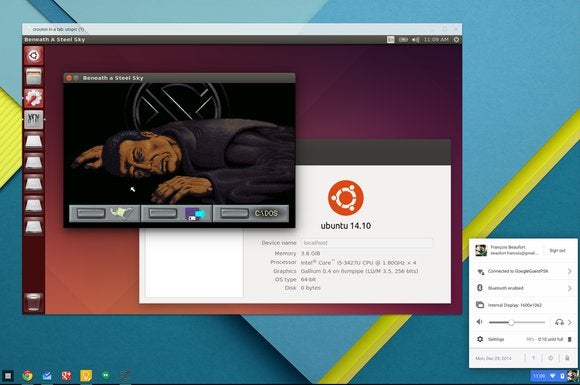
While Chrome OS is based on Linux, Chrome OS does have some features you can’t use on desktop Linux.

RELATED: How To Watch Netflix On Ubuntu with the Netflix Desktop App Some Software Runs on Chrome OS, But Not Linux Installing Linux alongside Chrome OS is the most convenient option for most people, but desktop Linux die-hards who really don’t care about Chrome OS may prefer a dual-boot system. You can also set it desktop Linux in a dual-boot system, installing the traditional Linux system to an SD card or USB drive and booting from it. This also has the benefit of using the same hardware drivers included with your Chromebook for the Linux system, so everything should work well. You can switch between the Chrome OS desktop and your traditional Linux interface with a keystroke, practically using both at the same time. Crouton allows you to install desktop Linux side-by-side with your Chrome OS system. You can install desktop Linux on your Chromebook in one of two ways. RELATED: How to Install Ubuntu Linux on Your Chromebook with Crouton You can also add an SD card or USB drive to your Chromebook for more space, but SD cards and USB drives are slower - they’re good for media, but not ideal for applications and other things you might want on your local hard drive. Mechanical hard drives will be slower than SSDs, which is why they’re being phased out. Of course, if you want to use a typical desktop Linux system, you might want more storage space for applications and your personal files.īear this in mind when picking up a Chromebook. You may want to get a Chromebook with a 32 GB SSD or even a much larger mechanical hard drive, if you can find one. Google’s vision is that you have a small local operating system - that’s Chrome OS - and everything else will be stored in the cloud. RELATED: Living With a Chromebook: Can You Survive With Just a Chrome Browser?Ĭhromebooks come with very little local storage space, often a fairly small 16 GB solid-state drive. If you want a complete Linux desktop experience, you’ll want an Intel-based Chromebook. Most other closed-source software will only support Intel-based Linux systems, too. Adobe’s Flash browser plug-in (You can run Flash in the Chrome OS environment, but the Flash browser plug-in for Linux only supports Intel systems, not ARM ones.).Steam for Linux and its hundreds of Linux games.


 0 kommentar(er)
0 kommentar(er)
